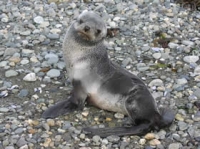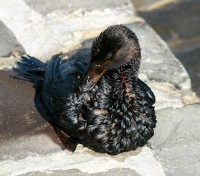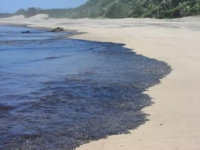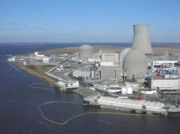2. Oil Pollution
What harm does oil spilt at sea do?
The exact nature and duration of any impacts from an oil spill depend on a number of factors. These include
- the type and amount of oil and its behaviour once spilled
- the physical characteristics of the affected area
- weather conditions and season
- the type and effectiveness of the clean-up response
- the biological and economic characteristics of the area and their sensitivity to oil pollution
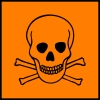
Typical effects on marine organisms range across a spectrum from toxicity (especially for light oils and products) to smothering (heavier oils and weathered residues). The presence of toxic components does not always cause mortality, but may induce temporary effects like narcosis and tainting of tissues, which usually subside over time (ITOPF).
Impact at sea
Oil slicks, droplets and 'chocolate mousse' particularly affect organisms which come to the surface to breathe, dive into the water to find food, or aggregate at or near the water surface. Oiling can be specific to certain organs, and interfere physically with the organism's movement, feeding and/or other actions. Oil slicks also have repercussions for floating solid waste, navigation buoys, vessels, fishing gear, shellfish farming, rafts, net pens and so on.
Of all that can be oiled or intoxicated, the victims which particularly concern us are two groups of organisms: seabirds and mammals. Their lives depend on regular contact with the water surface; in the case of seabirds to find food and rest between flights, and for mammals, to breathe at the water surface. Hydrocarbons on the water surface present a major risk of ingestion, inhalation and oiling of their fur or feathers.
The oiling of bird feathers causes a loss of thermal insulation, buoyancy and lift. For mammals that lick their coats, oiling leads to the risk of ingestion of oil. Other threats to wildlife are the risks of direct ingestion, irritation of the eyes and nostrils, inhalation of toxic vapours, suffocation by coating with oil as well as longer term toxic effects impairing the organism's metabolism (Cedre 2007).
Pollution of the shoreline
When an oil spill reaches the shoreline, or occurs very near the coast, the phenomena of soiling and coating in oil can have an impact on the populations in the intertidal zone and the various human activities which take place by the sea. Marine birds and mammals are also obvious victims, such as numerous species of birds feeding on the foreshore at low tide and nesting on the seafront, or marine mammals resting on the shore. However, the algae, fish and shellfish which live in coastal pools, on the rocks and in the sand or mud, are inevitably affected.
Depending on the type of shoreline, the impact can range from being relatively limited to, at the other end of the spectrum, extremely dramatic. The sensitivity of different substrates to oil varies considerably, from rocky coasts to pebble beaches, gravel, coursegrain sand, fine-grain sand, marshland, coral reefs, and so on (Cedre 2007).
Economic impacts
Contamination of coastal amenity areas is a common feature of many oil spills, leading to interference with recreational activities such as bathing, boating, angling and diving. Hotel and restaurant owners and others who gain their livelihood from the tourist trade can also suffer temporary losses. A return to normal requires an effective clean up programme and the restoration of public confidence.
Industries that rely on seawater for their normal operation can also be adversely affected by oil spills. Power stations and desalination plants which draw large quantities of seawater can be particularly at risk, especially if their water intakes are located close to the sea surface, thereby increasing the possibility of drawing in floating oil. The normal operations of other coastal industries, such as shipyards, ports and harbours, can also be disrupted by oil spills and clean-up operations (ITOPF).
Want to know more? - Just follow the links
